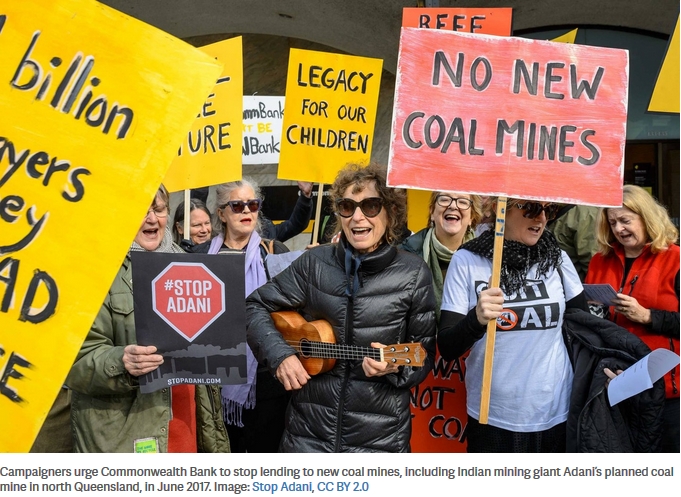
Commonwealth Bank, one of Australia’s ‘big four’ banks on Thursday signalled that it will end all new investments in coal, a move that was welcomed by climate and environmental campaigners across the country.
In a statement delivered at the bank’s annual general meeting, Catherine Livingstone, chairman, Commonwealth Bank, told shareholders: “We acknowledge the concerns some (stakeholders) have raised regarding the role banks play in supporting the fossil fuel industry.”
Livingstone added: “Shareholders should note that our coal funding is comparatively small and has been trending down for some time. We expect that trend to continue over time as we help finance the transition to a low carbon economy.”
The bank has for many years been under fire from campaigners, who have urged it to stop all financing for coal. It is one of Australia’s largest lenders to the fossil fuel industry, with responsible financing advocacy group Market Forces estimating that it lent almost A$3.9 billion (US$3 billion) to fossil fuel projects in 2016 alone. Since 2008, it has lent a total of A$24 billion to the polluting sector.
The bank has not lent to a new coal project since November 2015, when it funded a A$30 million corporate finance package for Australian mining and resources firm Macmahon, which included support for a coal project in Mongolia.
Its commitment to phase out coal funding comes four months after its first climate policy statement was widely panned by activists for failing to make any mention of reducing lending to fossil fuels even as it pledged to support the transition to a net zero emissions economy by 2050.
At Thursday’s meeting, Livingstone said that the bank would “evolve” its climate policy statement after the results of an ongoing climate scenario analysis project are known. A Commonwealth Bank spokesperson told Eco-Business that the scenario analysis will be completed by the end of 2018. There was no timeline for the next iteration of the bank’s Climate Policy Position Statement.
Activists from the organisations that have led the campaign against Commonwealth Bank— anti-fossil fuel group 350.org, Greenpeace, and Market Forces—welcomed the news.
Jonathan Moylan, campaigner, Greenpeace Australia Pacific, said in a statement that “Commonwealth Bank have today set a new standard for financial investment in Australia”.
“By ruling out future investments in coal they have shown they are willing to literally put their money where their mouth is on fossil fuel investment,” Moylan added, and called on the other three banks that make up Australia’s ‘big four’—Westpac, National Australia Bank, and Australia and New Zealand Banking Group (ANZ), to follow suit.
The remaining three banks have climate policies which restrict lending to coal and other fossil fuels, but have not ruled it out altogether.
Westpac, for instance, released a Climate Change Action Plan in April this year which says it will only lend to coal mining projects if the coal meets a certain energy density requirement. ANZ has a similar stance, saying it “will consider financing new coal fired power plants if they use advanced technologies and higher quality thermal coal to significantly reduce emissions”.
Julien Vincent, executive director, Market Forces, noted in a statement that “Commonwealth Bank’s exit is one of the starkest indicators yet that coal has no future.”
“This announcement adds to powerful chorus of business and investor voices making it plain coal is past its best-before date,” he added. “We can only hope this cuts through to the tone deaf elements in the political establishment, which would prefer to sink public funds into new dirty and expensive coal projects.”
While the bank has not indicated a timeline for this transition, analysis by Market Forces showed that all big four banks in Australia could be largely coal free by 2021, Vincent told Eco-Business. “When it comes to setting targets, we think that’s where the banks need to be,” he added, and called on Commonwealth Bank to stop lending to all new fossil fuel projects, not just coal.
Blair Palese, chief executive officer, 350.org, added: “For four years we have worked with the bank, protested and worked with thousands of people around Australia to divest from the bank and demand leadership.”
“Today we saw leadership and we say thank you,” she said.
